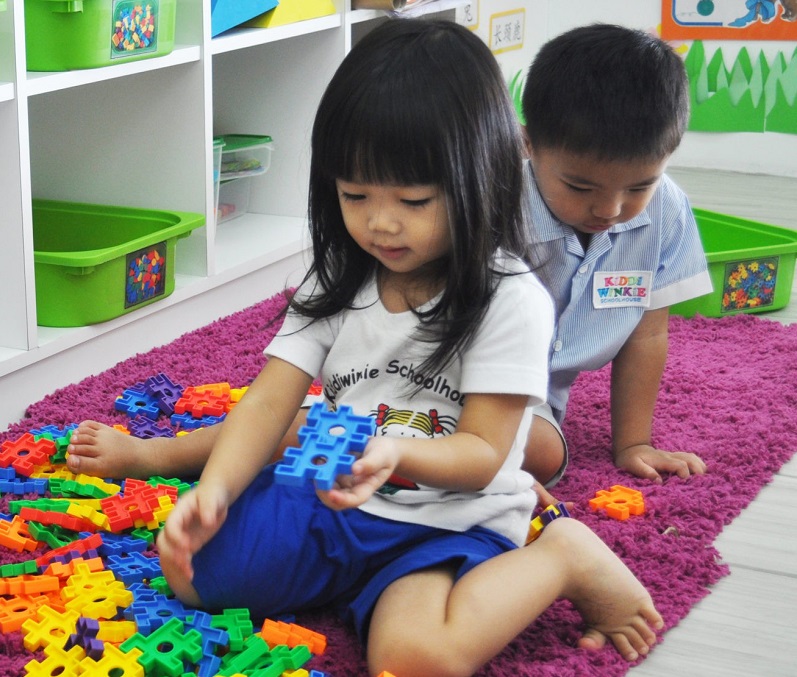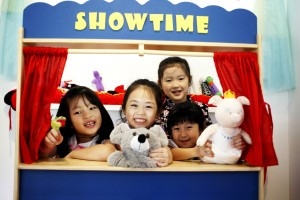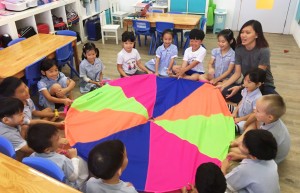Educators have the challenging task of imparting soft skills that children need to rise up to future challenges.
But as much as professional skills may be important, soft skills, which can be adapted and refined over the years, must be introduced to preschoolers from as early as possible.
These soft skills, also known as core skills or employability skills, are traits that can be applied across various life situations and job scopes.
In the competitive and globalised world that we live in today, here are five soft skills that children need to face the challenges in the future, and how you can help your child attain them!
1. Allow Plenty of Time for Purposeful Play
Soft Skill: Critical Thinking

In today’s world, children cannot simply rely on rote learning and memory work. It is important for them to be able to analyse, compare and infer information from their surroundings.
Play can be unstructured where children play independently, but purposeful play requires an adult to organise an activity which facilitates their play time, in order to extend or reinforce their learning.
By engaging in purposeful play, these activities help your children learn how to make decisions and to evaluate an issue or problem posed to them. It gives them the hands-on experience to discover, explore and create new devices, or simply add on to existing ones.
With this skillset, children will be more open to trying alternative solutions when faced with a problem.
2. Give Them Room to Pretend and Imagine
Soft Skill: Creativity
A child’s imagination is limitless. As a key component of creativity, imagination plays a crucial part in every child’s cognitive and social development.
To streamline their thinking process, imaginative play or pretend play gives them an opportunity to develop their ideas, as well as builds the children’s communication and social emotional skills.
With creativity, children will not only be able to express their unique individuality through their ideas and projects, but they will also process information faster as they are able to visualise auditory information.
3. Encourage Regular Sharing of Thoughts and Ideas
Soft Skills: Presentation and Public Speaking Skills
In their lifetime, your children will have to communicate, present and persuade others, be it during their schooling years or upon entering the workforce. During family dinners, give them opportunities to share their thoughts and ideas confidently with family members.
Learning to be confident in front of an audience starts at an early age. Developing public speaking and presentation skills help children learn to communicate their thoughts and ideas to others in a clear and coherent manner.
Do remember to offer praises and give encouragement – this is one skill they can constantly improve on, even in adulthood.
4. Let Them Play with Other Children
Soft Skills: Teamwork and Collaboration
Working in either large or small groups is inevitable whether in school, work or even at home. The importance of teamwork teaches children that success is achieved through every individual’s effort.
Parents can encourage teamwork by gathering the kids to work together on a collaborative project such as building a Lego structure or completing a puzzle.
Teamwork also requires them to share their ideas and contribute towards providing solutions. In the process, children also learn to receive and give feedback positively.
5. Let Them Know It’s Okay to Make Mistakes
Soft Skill: Building Resilience
Parents must let their children know that it is okay to ask for help in times of trouble, and to make mistakes – that way, it would minimise the chances of their stresses building up.
While children may lack the ability to express their frustrations or fears, adults can teach them how to work through the problem positively.
Learning to manage and regulate emotions is an ongoing process to build resilience. This strengthens a child’s ability to bounce back from the stresses of life and become better prepared to meet future life challenges.
Contributed by Pooja Vishindas, Head of Training and Curriculum
About the Expert:
With over 20 years of early childhood experience, Pooja Vishindas is an expert in early care and education. A former principal in several preschool operators, she obtained her Bachelor of Education (Early Childhood Education) from the University of South Australia and earned a place on the Dean’s Merit list. At present, she is the Head of Training and Curriculum at Babilou Family Singapore.







